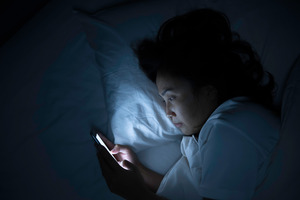
Have you not been able to get a good night’s rest lately? This could potentially be a consequence of sleep apnea, a disorder where your slumber is frequently disrupted due to pauses in your breathing. However, your phone could also be playing a part in preventing you from getting the sleep you deserve. Here’s a brief look at why staring at a screen right before bedtime could be causing problems with your sleep.
How Can Your Phone Impact Your Sleep?
Like many electronic devices, the screen of your phone emits blue light. This is a specific type of light that can suppress the production of melatonin, which is a hormone that helps regulate the sleep cycle. Less melatonin means that you will have a harder time falling asleep.
Consequently, by looking at your phone right before bed, you could be making it more difficult for your body to get the rest it needs. For people who are already struggling with sleep apnea, this can be especially problematic.
What Can You Do About the Effects of Blue Light?
If the blue light from your phone is making it harder to sleep, then the solution is obvious: avoid looking at your phone right before you turn in for the night. It’s generally recommended that you not use any electronic devices for at least an hour prior to your normal bedtime. Look for other ways to wind down, such as reading a book, writing in a journal, working on a puzzle, and so on.
It should be noted that you can mitigate the effects of blue light by wearing glasses with an orange tint. These glasses can have a significant impact on the quality of your slumber; as such, you may benefit from wearing them for several hours prior to bedtime.
What About Sleep Apnea?
Of course, if you’re currently struggling with sleep apnea, you will definitely want to take steps to have it treated as soon as possible. Otherwise, it could lead to heart disease and various other health problems.
Sleep apnea is traditionally treated with a CPAP machine, but if you are unable to tolerate this option, you can try wearing a personalized oral appliance instead. An oral appliance can move your jaw slightly forward to help you maintain an open airway, thus reducing the chances of your breathing being interrupted.
About the Author
Dr. Bernard L. Greenbaum has more than 25 years of dental experience. He is a diplomate of the American Board of Dental Sleep Medicine, and he helps patients overcome their sleep-disordered breathing with a wide range of oral appliances. To schedule a consultation with Dr. Greenbaum at Bethesda Center for Dental Sleep Medicine & TMJ Therapy, visit his website or call (301) 530-3600.
